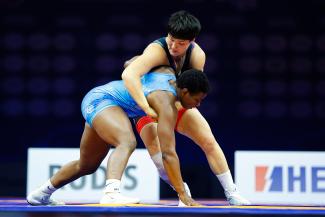RIYADH, Saudi Arabia (November 20) -- Freestyle and Women's Wrestling will be in action at the Islamic Solidarity Games 2025 on day three in Riyadh. Freestyle will be in 57kg and 65kg while women's will be in 62kg, 68kg and 76kg.
WATCH LIVE | LIVE MATCH ORDER | PHOTOS
13:15: Aiperi MEDET KYZY (KGZ) secures her spot in the 76kg final after a dominant technical superiority win over Elmira YASIN (TUR). She will face Damola OJO (NGR) for the gold after the NIgerian defeated Wilita PELAGIE (CMR) 10-0 in the other semifinal.
13:00: Ruzanna MAMMADOVA (AZE) beats world bronze medalist Nigina SABIROVA (UZB) 6-0 to enter the 62kg final. Mammadova will face Esther KOLAWALE (NGR) for the gold.
12:55: Islam BAZARGANOV (AZE) ends Sayed ZAZAI (AFG) dream run with a 10-0 victory in the 57kg semifinals. Bazarganov got the trap-arm gut and turned Zazai four times. Zazai will still have a chance to win a bronze medal
12:45: World silver medalist Aiperi MEDET KYZY (KGZ) gets a four-pointer in the second period to take a comfortable 7-0 lead against Elmira SYZYDYKOVA (KAZ) at 76kg. She scores a stepout and takedown to finish with a 10-0 win and enter the semifinal at 76kg,
12:35: Rahman AMOUZAD (IRI) has not trouble to see off Ali RAHIMZADE (AZE), 7-0 and enter the final at 65kg. A lot of stepouts in this match from Amouzad as he has done all day
12:30: Damola OJO (NGR) gets a good win over Samar HAMZA (EGY), 8-2, at 76kg. Hamza was returning to the mat after a long break and after becoming a mother. Ojo moves into the 76kg semifinals.
12:20: Sayed ZAZAI (AFG) is on a dream run here! He first took out Yusuf DEMIR (TUR) and now he beats African champion and Olympian Diamantino IUNA FAFE (GBS), 13-10, at 57kg to reach the semifinals. Incredible
12:05: Olympic silver medalist Meerim ZHUMANAZAROVA (KGZ) is cautioned for slamming Nigar MIRZAZADA (AZE) when she was trying to pin the Azerbaijan wrestler. But that is the only mistake she makes in the semifinal. Zhumanazarova reaches the final at 68kg.
11:55: Esther KOLAWALE (NGR) gets the lace going to beat Selvi ILYASOGLU (TUR) at 62kg, 10-0. Kolawale, a U23 world bronze medalist, is one of the favorites to win gold here.
11:50: Abdulmazhid KUDIEV (TJK) takes out Bilol SHARIP UULU (KGZ) at 65kg. Kudiev had a 3-0 lead, thanks to a takedown but Sharip Uulu got a takedown in the final 15 seconds and as he was trying to turn Kudiev, the Tajikistan wrestler went out of bounds and referee blew the whistle which cancelled his final turn. Kudiev scores a late takedown to win 6-2
11:33: Islam BAZARGANOV (AZE) with some good defense against Ali MOMENI (IRI) to win a hard-fought 57kg bout 4-2. Momeni gave up a stepout to transfer criteria 2-2 lead to Bazarganov and was then hit with a caution which made it 3-2. Momeni pushed Bazarganov out but in par terre in the final 10 seconds. Iran challenged for a stepout but lost it.
11:28: Nigar MIRZAZADA (AZE) was in some trouble after Desi SINTA (INA) threw her for five and then a exposure to lead 7-0. But Mirzazada scores two four pointers and survives to win 12-7 at 68kg.
11:15: Upset in 68kg! World silver medalist and U23 world champion Nesrin BAS (TUR) began was looking to cradle Irina KAZYULINA (KAZ) but the Kazakhstan wrestler moved her over her back and then held Bas on the mat to secure a shocking fall. Bas is dumbfounded!
11:10: Gulomjon ABDULLAEV (UZB) does not have the fight in him for six minutes this time. He drops his 57kg bout against Abdumalik KARACHOV (KGZ), 10-2, majorly because of the conditioning.
10:55: World champion Rahman AMOUZAD (IRI) keeps a strong underhook on Umidjon JALOLOV (UZB) who is unable to find an opening and drops the 65kg bout 4-0. Amouzad did not engage much but Jalolov was supremely passive as well.
10:35: World and Olympic bronze medalist Gulomjon ABDULLAEV (UZB) survives a late flurry from Aiaal BELOLYUBSKII (TJK) who scored two takedowns in the final minute but Abdullaev, who led 5-4, stops the gut wrench attempt and gets two points for exposure to win 7-4 at 57kg.
10:25: World champion Rahman AMOUZAD (IRI) with two four-pointers in his 11-0 victory over Najib HASSANI (AFG) at 65kg. Next up for him is world bronze medalist Umidjob JALOLOV (UZB), who also won silver at U23 World Championships.
10:22: Olympic silver medalist Meerim ZHUMANAZAROVA (KGZ) gets the fall over Halima AKTER (BAN) at 68kg. She is the favorite to win the gold medal here.
10:20: Abdulmazhid KUDIEV (TJK) has to battle hard against Farouk JELASSI (TUN) but eventually prevails 20-8 at 65kg. Jelassi managed to hit a couple of four-pointers to make a match out of it.
10:15: A 10-0 technical superiority for world bronze medalist Nigina SABIROVA (UZB) against Mouda HAMDOUN (EGY) at 62kg. Too many half attacks from the Egypt wrestler who got countered by Sabirova.
10:10: Quick finishes everywhere! Bilol SHARIP UULU (KGZ) opens the 57kg competition with a quick 10-0 win over Abdullah ASSAF (PLE). In the next bout, world bronze medalist Umidjon JALALOV (UZB) uses the lace to beat Muhammad ABDULLAH (PAK) 10-0 at 65kg.
10:05: Early news that Zelimkhan ABAKAROV (ALB) is not wrestling at the Games. He has given a walkover in his first bout.
10:00: The third day of Islamic Solidarity Games 2025 will see action in Freestyle 57kg and 65kg and women's 62kg, 68kg and 76kg.



Share your thoughts.
Comments